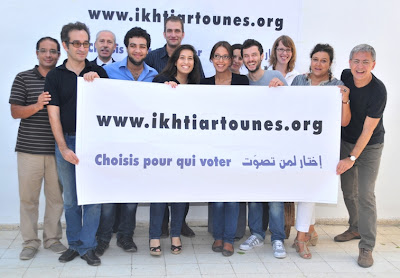Tunis, summer 2011
The elections campaign is now in full flow on the internet, on Facebook, in the newspapers. Candidates are already on the road giving speeches and holding public meetings.There are 105 parties registered and hundreds of independent lists, but I think personal trust, credibility and integrity will play more of a role in these elections than political ideology.
Everyone wants to see the people they are going to vote for. This is a small country and on a local level, people will be familiar with the people on the lists in their voting districts.
So far, most people have the same message – creating jobs, reforming the justice system and the police, boosting the economy in poor regions, fighting corruption and protecting the environment.
There are candidates who have already made all kinds of unrealistic promises, but people in Tunisia are not stupid. No-one believes that tomorrow everything will be solved. Even the few illiterate people here are street smart.
More than half the public are still undecided – they just don’t know who they will vote for and are waiting to see the campaign and find out more about the abilities of the various candidates. It is going to be less about parties and more about personalities.
I think it is wonderful, and the campaign season is going amazingly well. Wherever you go people are talking politics. Taxi drivers, students, activists, and business people – everybody is volunteering or discussing or involved in some kind of political activity.
All the big parties have Facebook pages and are tweeting like crazy, uploading photographs. I could spend the whole day following the various campaigns; I have to make an effort to limit myself to 45 minutes daily.
It’s incredible how mature people are and how fast they are learning what it will mean to run a country democratically and the importance that free discussion plays in that process.
It is good at this point to have so many parties. This amount of groups will more accurately reflect people’s views and will give a greater sense of legitimacy to the results. Those who are elected will at first be tasked with writing a new constitution, but will still function as a de facto parliament.
All the secular, moderate, post-revolutionary political parties are facing a particularly big challenge to convince the public to vote for something new. I have strong doubts that all the old parties will be able to solve Tunisia’s problems, and that includes the Muslim Brotherhood party, Ennahda.
Some are still living in the 1970s and 1980s, with many in the movement still privately dreaming of setting up an Islamic republic. There are some who talk in double-speak; they refer to personal freedom, and pledge that liberal democracy is untouchable, but in reality they do not believe in the separation of religion and state and their positions remain ambiguous. Ennadha even, here and there, have women connected to the party who are not veiled, but this doesn’t mean anything. It is cheap PR.
However, they currently seem the strongest party and will probably be part of any new government, so people will see for themselves what their true face is. And I hope Ennadha will be involved in the government. This will not only test their responsibility and ability but will be healthy for Tunisia`s young democracy. It won’t be good if only secular parties are represented, and won’t be democratic if such a popular party is not integrated in a legitimate government.
Then again, it is impossible to gauge their actual strength. There have been various opinion polls but none of them have been serious or meaningful.
There are fears that some elements of the former regime could create security problems here and there during the election season, but it won’t be possible for them to affect an unstoppable process. They can’t stop history. I am optimistic; I think turn-out will be extremely high. It won’t be easy, but in the end the people will win.
* Article first published with International War and peace Reporting, http://iwpr.net/report-news/tunisian-election-season-kicks
* More info about elections in Tunisia: http://www.atide.org/
* You are Tunisian and you are not sure who to vote for? Go to www.ikhtiartounes.org
* Watch 2 videos by Association Tunisienne des Femmes Démocrates (ATFD) to motivate women to vote on October 23 - an dnot let men steal their votes/voices:
_ http://www.youtube.com/watch?feature=player_embedded&v=lhwvhjwpJK4
_ http://www.youtube.com/watch?feature=player_embedded&v=xfv6paL7Gvk
Fouad Hamdan, a former DPA correspondent in Cairo and the Gulf, set up Greenpeace Lebanon in 1994-1999. He was the founding executive director of the Arab Human Rights Fund in Beirut in 2008-10. Since January 2011 he has been working on democracy-building projects in Tunisia, Libya and Egypt.



























